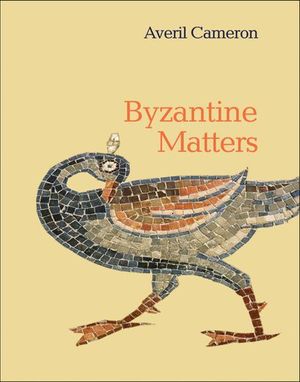Byzantine Matters
Published by Princeton University Press
A renowned historian examines the neglected story of Byzantium and what it can teach us about Western history: a “feisty and provocative manifesto” (Times Literary Supplement, UK).
For many of us, Byzantium remains “byzantine”—obscure, marginal, difficult. Despite the efforts of recent historians, prejudice still skews our understanding of the Byzantine civilization, often reducing it to a poor relation of Rome and the rest of the classical world. In this book, Averil Cameron presents an original and personal view of the challenges and questions facing historians of Byzantium today.
The book explores five major themes, all subjects of controversy. “Absence” asks why Byzantium is routinely ignored or relegated to a sphere of its own. “Empire” reinserts Byzantium into modern debates about empire, and discusses the nature of its system and its remarkable longevity. “Hellenism” confronts the question of the “Greekness” of Byzantium, and of the place of Byzantium in modern Greek consciousness. “The Realms of Gold” asks what lessons can be drawn from Byzantine visual art, and “The Very Model of Orthodoxy” challenges existing views of Byzantine Christianity.
Throughout, Cameron demonstrates why it is so important to integrate Byzantium into wider histories, and lays out why this civilization should be central to ongoing debates about the relationships between West and East, Christianity and Islam, Catholicism and Eastern Orthodoxy, and the ancient and medieval periods. The result is a forthright and compelling call to reconsider the place of Byzantium in Western history and imagination.
For many of us, Byzantium remains “byzantine”—obscure, marginal, difficult. Despite the efforts of recent historians, prejudice still skews our understanding of the Byzantine civilization, often reducing it to a poor relation of Rome and the rest of the classical world. In this book, Averil Cameron presents an original and personal view of the challenges and questions facing historians of Byzantium today.
The book explores five major themes, all subjects of controversy. “Absence” asks why Byzantium is routinely ignored or relegated to a sphere of its own. “Empire” reinserts Byzantium into modern debates about empire, and discusses the nature of its system and its remarkable longevity. “Hellenism” confronts the question of the “Greekness” of Byzantium, and of the place of Byzantium in modern Greek consciousness. “The Realms of Gold” asks what lessons can be drawn from Byzantine visual art, and “The Very Model of Orthodoxy” challenges existing views of Byzantine Christianity.
Throughout, Cameron demonstrates why it is so important to integrate Byzantium into wider histories, and lays out why this civilization should be central to ongoing debates about the relationships between West and East, Christianity and Islam, Catholicism and Eastern Orthodoxy, and the ancient and medieval periods. The result is a forthright and compelling call to reconsider the place of Byzantium in Western history and imagination.
BUY NOW FROM
COMMUNITY REVIEWS

